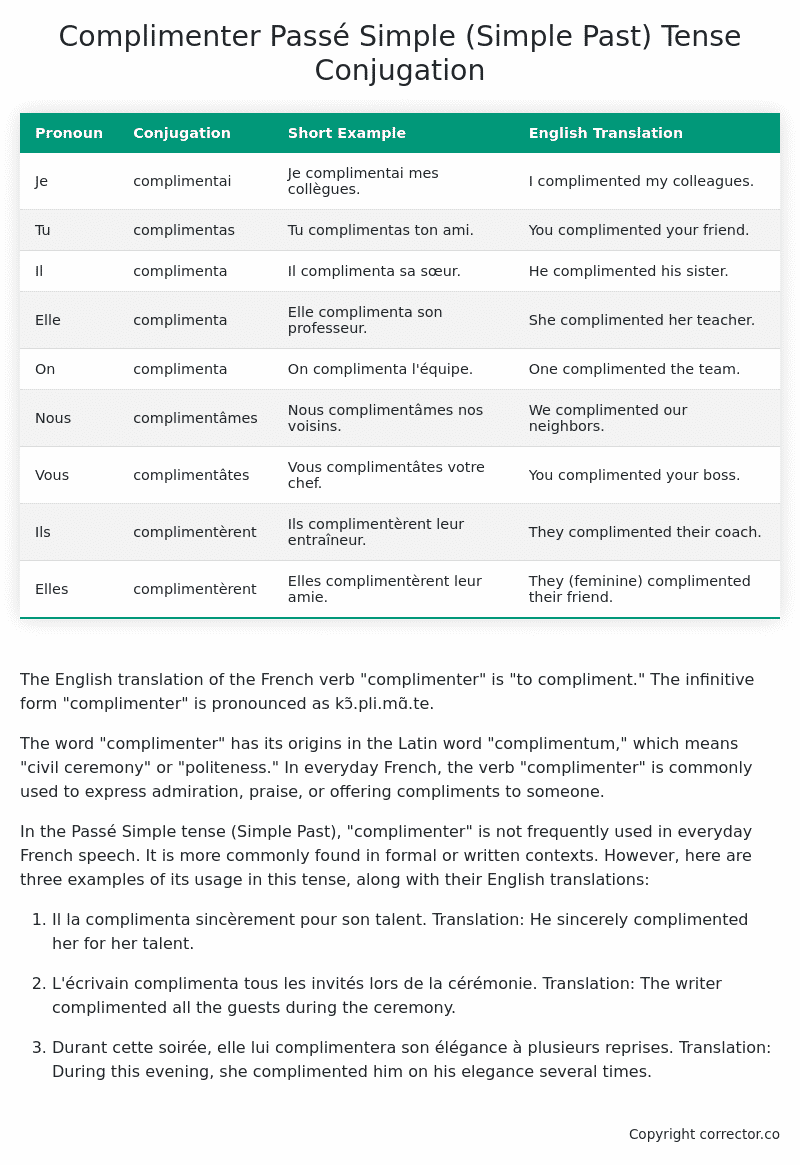Passé Simple (Simple Past) Tense Conjugation of the French Verb complimenter
Introduction to the verb complimenter
The English translation of the French verb “complimenter” is “to compliment.” The infinitive form “complimenter” is pronounced as kɔ̃.pli.mɑ̃.te.
The word “complimenter” has its origins in the Latin word “complimentum,” which means “civil ceremony” or “politeness.” In everyday French, the verb “complimenter” is commonly used to express admiration, praise, or offering compliments to someone.
In the Passé Simple tense (Simple Past), “complimenter” is not frequently used in everyday French speech. It is more commonly found in formal or written contexts. However, here are three examples of its usage in this tense, along with their English translations:
-
Il la complimenta sincèrement pour son talent.
Translation: He sincerely complimented her for her talent. -
L’écrivain complimenta tous les invités lors de la cérémonie.
Translation: The writer complimented all the guests during the ceremony. -
Durant cette soirée, elle lui complimentera son élégance à plusieurs reprises.
Translation: During this evening, she complimented him on his elegance several times.
Table of the Passé Simple (Simple Past) Tense Conjugation of complimenter
| Pronoun | Conjugation | Short Example | English Translation |
|---|---|---|---|
| Je | complimentai | Je complimentai mes collègues. | I complimented my colleagues. |
| Tu | complimentas | Tu complimentas ton ami. | You complimented your friend. |
| Il | complimenta | Il complimenta sa sœur. | He complimented his sister. |
| Elle | complimenta | Elle complimenta son professeur. | She complimented her teacher. |
| On | complimenta | On complimenta l’équipe. | One complimented the team. |
| Nous | complimentâmes | Nous complimentâmes nos voisins. | We complimented our neighbors. |
| Vous | complimentâtes | Vous complimentâtes votre chef. | You complimented your boss. |
| Ils | complimentèrent | Ils complimentèrent leur entraîneur. | They complimented their coach. |
| Elles | complimentèrent | Elles complimentèrent leur amie. | They (feminine) complimented their friend. |
Other Conjugations for Complimenter.
Le Present (Present Tense) Conjugation of the French Verb complimenter
Imparfait (Imperfect) Tense Conjugation of the French Verb complimenter
Passé Simple (Simple Past) Tense Conjugation of the French Verb complimenter (You’re reading it right now!)
Passé Composé (Present Perfect) Tense Conjugation of the French Verb complimenter
Futur Simple (Simple Future) Tense Conjugation of the French Verb complimenter
Futur Proche (Near Future) Tense Conjugation of the French Verb complimenter
Plus-que-parfait (Pluperfect) Tense Conjugation of the French Verb complimenter
Passé Antérieur (Past Anterior) Tense Conjugation of the French Verb complimenter
Futur Antérieur (Future Anterior) Tense Conjugation of the French Verb complimenter
Subjonctif Présent (Subjunctive Present) Tense Conjugation of the French Verb complimenter
Subjonctif Passé (Subjunctive Past) Tense Conjugation of the French Verb complimenter
Subjonctif Imparfait (Subjunctive Imperfect) Tense Conjugation of the French Verb complimenter
Conditionnel Présent (Conditional Present) Tense Conjugation of the French Verb complimenter
Conditionnel Passé (Conditional Past) Tense Conjugation of the French Verb complimenter
Conditionnel Passé II (Conditional Past II) Tense Conjugation of the French Verb complimenter
L’impératif Présent (Imperative Present) Tense Conjugation of the French Verb complimenter
L’impératif Passé (Imperative Past) Tense Conjugation of the French Verb complimenter
L’infinitif Présent (Infinitive Present) Tense Conjugation of the French Verb complimenter
L’infinitif Passé (Infinitive Past) Tense Conjugation of the French Verb complimenter
Le Participe Présent (Present Participle) Tense Conjugation of the French Verb complimenter
Le Participe Passé (Past Participle) Tense Conjugation of the French Verb complimenter
Struggling with French verbs or the language in general? Why not use our free French Grammar Checker – no registration required!
Get a FREE Download Study Sheet of this Conjugation 🔥
Simply right click the image below, click “save image” and get your free reference for the complimenter Passé Simple tense conjugation!

Complimenter – About the French Passé Simple (Simple Past) Tense
Formation
Usage
Narration
Historical Context
Interactions with other tenses
Passé Composé
Imparfait
Conditional and Subjunctive
Summary
I hope you enjoyed this article on the verb complimenter. Still in a learning mood? Check out another TOTALLY random French verb conjugation!


